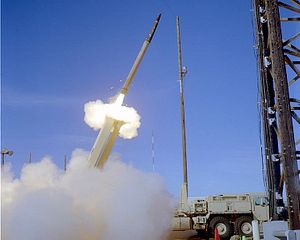On Thursday, Japan’s Yomiuri Shimbun reported that Tokyo would seriously consider purchasing the Terminal High-Altitude Area Defense (THAAD) missile defense system from the United States.
The Yomiuri noted that a “committee in charge will be set up at the Defense Ministry to start full-scale discussion of the issue, while Defense Minister Tomomi Inada is making arrangements to visit Guam on Dec. 11-12 to inspect the state-of-the-art missile defense system at a U.S. base.”
Earlier this year, the United States and South Korea jointly agreed to deploy THAAD in South Korea to counter ballistic missile threats from North Korea.
Asked by reporters about the possibility of a THAAD working group at the Defense Ministry, Inada said “We are investigating future systems for intercepting missiles.” She added that her ministry was “considering what can be done.”
Before her comments to reporters on Friday, Inada had addressed Japan’s interest in THAAD on Monday.
“In light of the current situation surrounding Japan, I believe it is important to ensure missile defense,” Inada remarked earlier this week, at a Japanese Defense Ministry press conference. Inada was asked about her plans to visit Guam to inspect U.S. ground-based THAAD interceptors.
She added that there was “no specific plan for a visit to Guam,” but that Japan was “conducting surveys and research on a future ballistic missile defense system, but at the moment, there is no specific plan for introducing new equipment such as the THAAD missile.”
“We will conduct further surveys and research and actively consider how to enhance Japan’s ballistic missile defense capability,” Inada concluded.
To date this year, North Korea has carried out over 18 separate ballistic missile tests in addition to two nuclear device tests. One North Korean ballistic missile test earlier this year resulted in debris splashing down within Japan’s exclusive economic zone, drawing sharp protest from Japanese Prime Minister Shinzo Abe.
That Tokyo would be interested in THAAD is not surprising. Tokyo already deploys considerably advanced missile defense capabilities, employing both Aegis-equipped, ship-based Standard Missile-3 and Patriot Advanced Capability-3 (PAC-3) interceptors.
Given the ongoing political scandal shaking South Korean President Park Geun-hye’s government in South Korea and the possibility that she may resign, potentially leading to an opposition party taking hold of the government in Seoul, South Korea’s THAAD deployment plans could be delayed or scuttled entirely.
In such a circumstance, Japan may be able to procure the battery intended for deployment in South Korea from the United States, at a potentially more favorable price point.

































